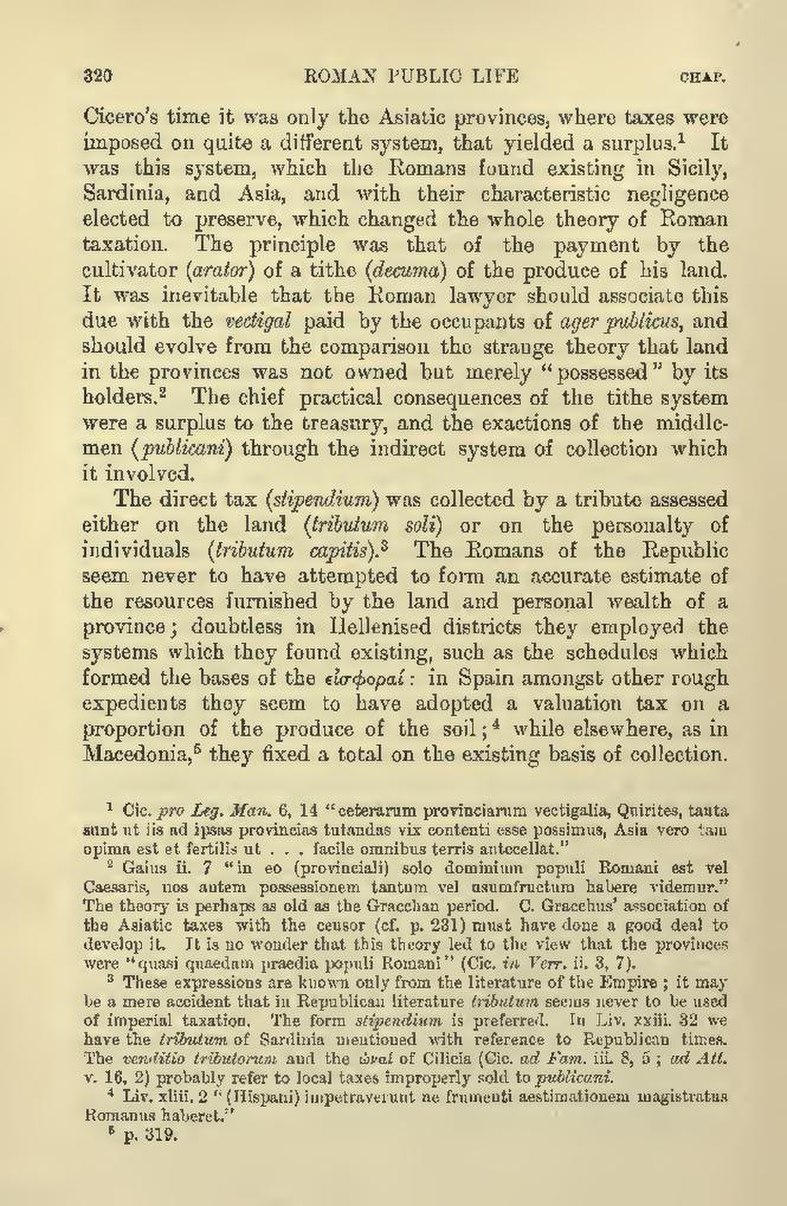Cicero's time it was only the Asiatic provinces, where taxes were imposed on quite a different system, that yielded a surplus.[1] It was this system, which the Romans found existing in Sicily, Sardinia, and Asia, and with their characteristic negligence elected to preserve, which changed the whole theory of Roman taxation. The principle was that of the payment by the cultivator (arator) of a tithe (decuma) of the produce of his land. It was inevitable that the Roman lawyer should associate this due with the vectigal paid by the occupants of ager publicus, and should evolve from the comparison the strange theory that land in the provinces was not owned but merely "possessed" by its holders.[2] The chief practical consequences of the tithe system were a surplus to the treasury, and the exactions of the middlemen (publicani) through the indirect system of collection which it involved.
The direct tax (stipendium) was collected by a tribute assessed either on the land (tributum soli) or on the personalty of individuals (tributum capitis).[3] The Romans of the Republic seem never to have attempted to form an accurate estimate of the resources furnished by the land and personal wealth of a province; doubtless in Hellenised districts they employed the systems which they found existing, such as the schedules which formed the bases of the [Greek: eisphorai]: in Spain amongst other rough expedients they seem to have adopted a valuation tax on a proportion of the produce of the soil;[4] while elsewhere, as in Macedonia,[5] they fixed a total on the existing basis of collection.of Cilicia (Cic. ad Fam. iii. 8, 5; ad Att. v. 16, 2) probably refer to local taxes improperly sold to publicani.]
- ↑ Cic. pro Leg. Man. 6, 14 "ceterarum provinciarum vectigalia, Quirites, tanta sunt ut iis ad ipsas provincias tutandas vix contenti esse possimus, Asia vero tam opima est et fertile ut . . . facile omnibus terris antecellat."
- ↑ Gaius ii. 7 "in eo (provinciali) solo dominium populi Romani est vel Caesaris, nos autem possessionem tantum vel usumfructum habere videmur." The theory is perhaps as old as the Gracchan period. C. Gracchus' association of the Asiatic taxes with the censor (cf. p. 231) must have done a good deal to develop it. It is no wonder that this theory led to the view that the provinces were "quasi quaedam praedia populi Romani" (Cic. in Verr. ii. 3, 7).
- ↑ These expressions are known only from the literature of the Empire; it may be a mere accident that in Republican literature tributum seems never to be used of imperial taxation. The form stipendium is preferred. In Liv. xxiii. 32 we have the tributum of Sardinia mentioned with reference to Republican times. The venditio tributorum and the [Greek: ônai
- ↑ Liv. xliii. 2 "(Hispani) impetraverunt ne frumenti aestimationem magistratus Romanus haberet."
- ↑ p. 319.
